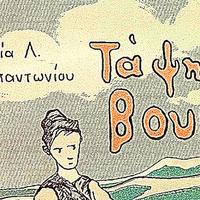16. Το πρώτο συσσίτιο
|premier|soupé
the||The first meal
||Mahlzeit
|primeiro|sopão
16. The first meal
16. El primer comedor social
16. La première soupe populaire
16. Pierwsza kuchnia dla zup
16. Первая столовая
16. İlk aşevi
Όταν γύρισαν από τους βλάχους ο Δήμος κι ο Φάνης και πλησίαζαν στις καλύβες, είδαν να βγαίνει αχνός από τη μεγάλη κατσαρόλα.
|||||||||||||||||vapeur||||
|returned|||Vlachs||Dimos|||Phanis||were approaching||huts|saw||"coming out"|steam||||pot
When the Δήμος and the Φάνης returned from the Vlachs and were approaching the huts, they saw steam rising from the big pot.
—Τι ωραία μυρουδιά!
||odeur
|beautiful|What a nice smell!
--What a lovely smell!
φώναξαν από λίγα βήματα μακριά.
called||few|steps away|
shouted from a few steps away.
—Τι; Έγινε κιόλας;
|It happened|already
-What? Already done?
—Έγινε!
It happened!
-Done!
είπε ο Αντρέας με την κουτάλα στο χέρι.
|||||ladle||
Andreas said with the ladle in his hand.
—Και τι φαγητό είναι;
-And what kind of food is it?
—Πατάτες με πατάτες, λέει ο Κωστάκης γελώντας.
Potatoes||potatoes||||laughing
-"Potatoes with potatoes," says Kostakis, laughing.
—Μη σας νοιάζει, παιδιά, λέει ο Δήμος, κι από αύριο θα 'χουμε κρέας να τρώμε.
||||||||||||||manger
not||"worry"||||||from tomorrow||will|we will have|||
-Don't worry, guys, says the Municipality, and from tomorrow we'll have meat to eat.
Είδαμε τον τσέλιγκα!
nous avons vu||berger
We saw||the shepherd
We saw the cheliga!
Τους διηγήθηκε πως είδαν την Αφρόδω με τον Λάμπρο, και πως ο παππούς τους, ο γερο-τσέλιγκας, τους είπε να στέλνουν ν' αγοράζουν όσο κρέας τούς χρειαστεί, ακόμα και γάλα.
||||||||||||||||tsélingas|||||||||||||
|"told"|how|saw||Aphrodo|||Lambros||||grandfather|||old man|old shepherd chief|||to|"to send"|to|buy|as much|||"they need"|even||
He told them how they had seen Aphrodo with Lambros, and how their grandfather, the old cheligas, had told them to send out to buy as much meat as they needed, even milk.
Μα ενώ μιλούσαν, όλο τριγύριζαν το γιαχνί.
||parlaient||||
but|"while"|talked|all around|stirred||the stew
But as they talked, they were always moving the yak around.
Ήταν τη στιγμή εκείνη με τον αχνό του και τη μυρουδιά του καλύτερο απ' όλα τ' αρνιά του τσέλιγκα.
||||||||||||||||agneaux||
||moment|that|||steam||||scent||best||||lambs||shepherd's
Er war in diesem Moment mit seinem Dampfen und seinem Geruch besser als alle Lämmer der Cheliga.
He was at that moment with his steaming and his smell better than all the lambs of the cheliga.
---
—Απίστευτο μου φαίνεται, λέει ο Κωστάκης, πώς αυτές οι πατάτες που ξεφλούδιζα έγιναν φαγητό.
|||||||||||j'ai épluché||
Unbelievable||seems||||how|||||I was peeling|became|
-It seems incredible to me, says Kostakis, how those potatoes I was peeling became food.
Το ίδιο κι ο Δημητράκης.
|same|||
So is Dimitrakis.
Δεν μπορεί να πιστέψει πώς έγιναν φαγητό οι ντομάτες που έκοβε.
||||||||||a coupé
|||believe||became|food||the tomatoes||was cutting
He can't believe how the tomatoes he was cutting became food.
Το ίδιο κι ο Γιώργος, το ίδιο κι ο Φουντούλης.
|||||||||the same
So is George, so is Hazel.
Παίζοντας έκαναν όλη αυτή τη δουλειά και να τι κατάφεραν!
|||||||||ils ont réussi
Playing|||||work||||they achieved
They did all this work by playing and this is what they achieved!
Τρώνε φαγητό δικό τους.
Ils mangent|||
They eat|food|their|
They eat their own food.
Καθένας εργάστηκε για τον εαυτό του, αλλά και για όλους· όλοι πάλι δούλεψαν για τον έναν.
||||||||||||ont travaillé|||
Each person|worked||||||||||again|worked|for||
Each worked for himself, but also for all; all worked for one.
Έτσι έκαναν εκείνο που λέμε κοινότητα.
||that||we say|community
So they made what we call a community.
Θα κατορθώσουν το ίδιο και για όλα τ' άλλα; Θα μπορέσουν ο ένας να εργάζεται για τους άλλους κι οι άλλοι για τον έναν; Τότε η μικρή τους κοινότητα θα γίνει παράδειγμα σε πολλές άλλες.
||||||||||pourront||||||||||||||||||||||||
|"achieve"|||||||||can||||working||||||||||||||community||become|example|||
Werden sie dasselbe für alles andere erreichen? Werden sie in der Lage sein, für die anderen zu arbeiten und die anderen für den einen? Dann wird ihre kleine Gemeinschaft ein Beispiel für viele andere werden.
Will they achieve the same for everything else? Will they be able to work for the others and the others for the one? Then their small community will become an example to many others.
Σηκώνουν λοιπόν τα ποτήρια τους και πίνουν στην υγειά της.
||||||||santé|
They raise|so then||glasses|||drink||to her health|
So they raise their glasses and drink to her.
—Πίνω αυτό το κρασί, λέει ο Κωστάκης και σηκώνει τον τενεκέ με το νερό, στην υγειά του σημερινού μας μάγειρα.
||||||||lève|||||||||||cuisinier
I drink|this||wine|||||lifts up||tin can|||||to the health||today's||cook
-"I drink this wine," says Kostakis, and lifts the water can, to our cook today.
—Πίνω αυτό το ρακί, λέει ο Αντρέας και σηκώνει το παγούρι του με το νερό, στην υγειά όλων των συντρόφων που μαγείρεψαν μαζί μου.
||||||||||gourde|||||||||amis||||
|||raki|||||raises||canteen|||||||of all||comrades||they cooked||
-"I drink this raki," says Andreas, and raises his canteen of water, to all the comrades who cooked with me.
—Πίνω τη βρύση όλη, λέει ο Φάνης, στην υγειά της κοινότητας.
||||||||||communauté
||the tap||||Fanis||health||community's health
-I drink the whole fountain, says Fanis, to the health of the community.
-Fanis, "Bütün çeşmeyi toplumun sağlığı için içiyorum" diyor.
—Εβίβα, εβίβα!
Viva|
Cheers, cheers!|
-Eviwa, eviwa!
φώναξαν και όλοι γελούσαν.
they shouted|||were laughing
they shouted and everyone laughed.
Μόνο ο Φουντούλης ήταν δακρυσμένος.
||||en pleurs
||Fundoulis||teary-eyed
Only Hazel was in tears.
Αυτός είχε καθαρίσει τα κρεμμύδια.
||nettoyé||
||cleaned||onions
He had peeled the onions.

